- vortextimes.com
- March 26, 2024
- 5:01 am
- No Comments

Exploring Panpsychism: A Dive into the Philosophy of Consciousness :
Introduction to Panpsychism: The ancient philosophical theory of panpsychism, which has received resurgence in cutting-edge times, asserts that the entirety within the universe is endowed with attention or a mind-like fine. This concept calls into query normal theories of recognition and forces us to reevaluate the nature of truth itself.
Table of Contents
Origins and Evolution
Panpsychism has its origins in the thoughts of historic Greek philosophers such as Thales and Plato, who proposed that everything possesses a soul or intelligence. Nonetheless, the phrase become first used within the late 16th century through the Italian philosopher Francesco Patrizi, who emphasised the innate soulfulness of all matters created.
Panpsychism received recognition within the 19th century, thanks to the support of outstanding individuals like William James and Arthur Schopenhauer. However, panpsychism changed into marginalised and consigned to metaphysical obscurity by the upward thrust of logical positivism inside the Nineteen Twenties.
Resurgence in Modern Thought

Debates and Critiques
Exploring Panpsychism's Implications
Rethinking Consciousness: Panpsychism forces us to rethink how we perceive attention. Panpsychism proposes that awareness permeates the universe in preference to being restrained to humans or unique complex structures.
Reconciling Science and Metaphysics: The revival of panpsychism brings to light the continuous struggle to bring metaphysical conjecture and clinical investigation into harmony. As our comprehension of the cosmos expands, we’re faced with essential inquiries concerning the essence of lifestyles.
Moral Issues: In the occasion that panpsychism is accurate, it gives ethical dilemmas concerning how we understand and engage with the environment. When making ethical choices, should we recollect the cognizance of inanimate items, flora, or animals?
Consequences for Artificial Intelligence: Panpsychism makes us consider the consequences for AI. Could synthetic intelligence (AI) evolve its personal type of consciousness if it is not in basic terms dependent on biological strategies?
FAQs (Frequently Asked Questions)
Q: Does panpsychism suggest that inanimate gadgets are sentient?
A: According to panpsychism, the entirety has a cognizance or thoughts-like excellent. Philosophical dialogue continues to surround the character of this consciousness in inanimate objects, though.
Q: How does panpsychism fluctuate from other theories of awareness?
A: Panpsychism holds that attention is inherent to everything, in comparison to materialism, which sees attention as an emergent function of complicated systems, and dualism, which maintains a difference between mind and matter.
Q: Can panpsychism be scientifically tested?
A: Because panpsychism is metaphysical, it’s miles nevertheless tough to empirically affirm. Although neuroscience and psychology can look at positive components of attention, the idea that the whole thing is inherently conscious remains theoretical.
Q: What are the moral implications of panpsychism?
A: Panpsychism forces us to reevaluate our moral obligations to the environment. Should all entities own cognizance, our interactions and values toward different beings and entities might require a reevaluation.
Q: How does panpsychism have an impact on our knowledge of synthetic intelligence?
A: The question of whether synthetic intelligence is capable of growing its personal focus is raised by means of panpsychism. Artificial intelligence (AI) structures might be able to subjective enjoy if consciousness isn’t always solely related to biological strategies.
FAQs (Frequently Asked Questions)
Panpsychism demanding situations us to bear in mind the idea that cognizance may be present for the duration of the universe in bureaucracy that we haven’t fully understood and to increase our philosophical perspectives. Panpsychism studies gives sparkling perspectives on the character of reality and our region in it as scientific study and philosophical conjecture merge.